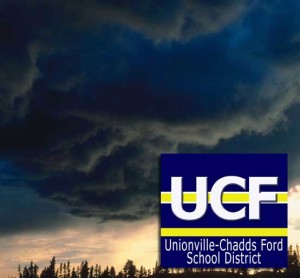By 5-4 margin, board straw poll says keep tax hike to .99% in Chesco, 4.61% in Delco
By Mike McGann, Editor, UnionvilleTimes.com

Unionville-Chadds Ford School District Administrators used dark clouds to illustrate the current financial challenges the district fces during Monday night's public hearing on the school budget.
EAST MARLBOROUGH — The Unionville-Chadds Ford Board of Education — by a narrow 5-4 margin — is opting to keep the planned tax increase at .99% in Chester County and 4.61% in Delaware County and Monday night told Superintendent of Schools Sharon Parker and her administration that it should continue to try to find just under $1.1 million in cuts to make up for losses in state aid.
The results of those cuts should be formally unveiled next Monday night as the board will be set to give preliminary approval to the 2011-12 school year budget, with final approval slated for late June. The specific cuts were not made public, although some of the board’s discussions suggested various cuts in both program and staff could be announced next week.
The district is facing cuts in various state aid categories, some expected, some a surprise.
The district’s Director of Business and Operations, Robert Cochran, detailed the fiscal realities the district faces, making a detailed presentation to the board and a packed conference room at the district’s administration offices.
Illustrating the current situation with dark storm clouds, Cochran highlighted the various issues that the district currently has to endure: lower than expected tax collection rates, due to defaults, reduced property assessments, eminent domain litigation that could cost an additional $900,000, low return on existing fund balances, increases in pension contributions, the lack of a collective bargaining agreement with the district’s teachers, the expected loss of stimulus funds, and roughly $800,000 of additional cuts in state aid that were not expected.
Even with a .99% tax increase in Chester County and 4.61% increase in Delaware County (the rate differs because of different valuation formulas — and the Delaware County number tends to fluctuate much more than the Chester County figure), total revenue is only going to be up .49% and total spending is only increasing .59%, both far below the current rate of inflation. The total budget calls for $69,768,266 in spending in the 2011-12 school year.
Still, Cochran pointed out various measures the district took during this budget year to contain expenses and put the district on a better financial footing: boosting local revenue, including higher rental fees for facility use and student activity fees, ending funds for community outreach, cutting positions, elimination of mid-day kindergarten busing, cutting overtime, ending discretionary travel and elimination of food at meetings. In addition, the district budgeted for a much larger pension contribution rate for the 2010-11 school year, and those funds were set aside to pay a similar expected increase in 2011-12.
The process that led to cuts and savings last year was used again this year to find options for additional budget cuts, Cochran said. He listed the various ways the district has worked to get input from the community, including various public events such as last month’s community conversation and the district Web site.
As was the case earlier in the process, the administration gave board members some $1.7 million in possible cuts, color coded with the administrations’ recommendations for cuts to reach $1.1 million.
The first step was for a straw poll by the members to offer their take on keeping the tax rate increase at .99% in Chester County or going to the full increase allowed by Act 1, roughly 1.4% — allowing the administration to craft a budget with or without the roughly $213,000 in additional revenue. There was a little bit of confusion about Parker’s position — initially member Jeff Hellrung reversed his call to take the maximum tax hike, saying he believed that Parker’s cut proposals indicated that she felt the cuts could be sustained without a profound impact.
“Honestly, I was hoping for 1.4%,” Parker said. “But having heard the comment around the table, it was clear that there wouldn’t be the votes to support it.”
Upon discovering that Parker was merely complying with what appears to be the sentiment of a majority of the board, Hellrung returned to his previous stance.
Keith Knauss, Paul Price, Corrine Sweeney, Timotha Trigg, and Frank Murphy expressed support for keeping the tax increase to .99%, while Eileen Bushelow, Hellrung, Holly Manzone and Jeff Leiser said they’d prefer to take the full legally permitted tax hike.
“We have to plan for the worst, and hope for better times,” Knauss said, saying he felt it would be easier to cut spending as much and as soon possible, rather than waiting until it becomes a crisis in coming years.
“I think we’re cutting dangerously close to what makes a district great,” Leiser said. “I think we’re cutting dangerously close to people’s livelihood, what makes Unionville, Unionville.”
While various board members asked questions about a lengthy list of proposed cuts in program and staff, with much conversation focused some of the details of cuts from middle school German, to building allocations to social workers, while weighing the merits of restoring funding for the district’s SAGE program and summer building maintenance program, which typically hires local students to help get the district buildings ready for the next school year.
Still, the specifics weren’t shared with the public, leading to at least some disappointment being expressed by local residents.
“I’m a little amazed,” said Bruce Yelton of Pocopson. I wondered what cuts were made to get us from 1.4% to 1.0% and we didn’t hear that. I’m also surprised that you never even considered going to 1.2%.”






